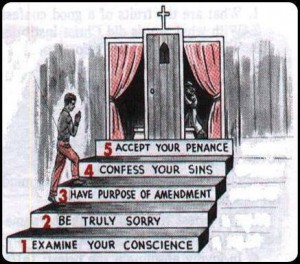 I stumbled across a video which presents a sermon on how to behave before during and after making a sacramental confession. There is some good advice in the sermon, particularly about the need to examine one’s conscience and the confess all mortal sins in both kind and number with just the important details or circumstances that can affect the gravity of a sin. For example, there is a difference between “I pushed my brother” and “I pushed my brother off a cliff.” Also, there is a very good point about avoid vague language like, “I have been as prayerful as I should have been.” “As I should have been” tells the confessor, and yourself, nothing.
I stumbled across a video which presents a sermon on how to behave before during and after making a sacramental confession. There is some good advice in the sermon, particularly about the need to examine one’s conscience and the confess all mortal sins in both kind and number with just the important details or circumstances that can affect the gravity of a sin. For example, there is a difference between “I pushed my brother” and “I pushed my brother off a cliff.” Also, there is a very good point about avoid vague language like, “I have been as prayerful as I should have been.” “As I should have been” tells the confessor, and yourself, nothing.
The preacher also points out that a good confession is going to be BRIEF. If a person is prepared, and just “says it”, the confession will be concise.
I would make a few additions.
In the beginning, the preacher stresses contrition for validity. However, attrition can be sufficient for a valid absolution. Of course contrition is one of those words that can be polyvalent. Also, true contrition is far better and should always be our goal. This is going to be the result of a thorough examination of conscience.
I would add as well: Don’t look at or stare at or converse with people waiting in line. Leave them alone.
There is good advice in this video.
See also my own TIPS FOR MAKING A GOOD CONFESSION (available also now in SPANISH) HERE.
A note to priests who could but don’t schedule generous confession times in the parishes and teach well about the importance of this sacrament.
You are probably going to wind up in Hell.
Finally…
GO TO CONFESSION.


































Very good. After almost every confession I make the priest says,”Thank God for making a good confession”.
I’ve heard it so often that I’ve come to assume it’s virtually a formula they teach priests in Seminary to say after every confession. Does it really have any meaning? Do priests reserve this praise for truly “good” confessions?
I remember when I took my (very) young daughter to her first confession. She was very nervous beforehand but when she came out she was bursting with pride and told me the priest had said she had made a good confession. This remark of the priest went a long way towards easing her anxiety about it all.
If you have finished your preparation, and find yourself in line, pray for the grace of a good confession for the others in line.
Be BRIEF … Hmmm … What if something bad happened, and you went to your natural father to tell him, and he said “Well, keep it short. I’ve got a lot to do.” If a priest wants to absove me without giving advice, that’s totally fine. However, if a priest chooses to give me advice in the confessional then there are a few things you should know, otherwise I spend the two minutes a month that I have to get some spiritual help listening to someone tell me stuff that is totally irrelevant to my situation. Be BRIEF. Yeah, okay. Priests are supposed to be servants to the servants of God – not overlords.
MB, calm down. Remember the Priest is another Christ. Some Priest sadly, are lousy in the confessional, that doesn’t change anything about your confession or absolution. Ask around, there are Priest who are really good in the confessional or find a Priest who will council you privately outside of the confessional.
God bless You!
Not – Ah, yes the ever elusive ‘good spiritual director.’ That’s great advice. If you find one let me know.
So… I made my regular confession, then I told the priest I’d remembered sins from my past that I’d like to confess. He said, basically, “I don’t usually or like to interrupt confessions, but your past sins were already forgiven and bringing up old ones is a form of pride… thinking too much about yourself… we should always live in the present… then he talked a lot about The Little Flower and St. Faustina… trusting in God’s mercy… “. So, I didn’t get to confess my forgotten sins. I tried to tell him several times that I’m not sure if they were mortal sins or not because, at the time I didn’t even think about them being so wrong (so does that make them NOT mortal because I didn’t meet the 3 criteria of a mortal sin?)… I left in tears feeling a bit like a dangling participle.